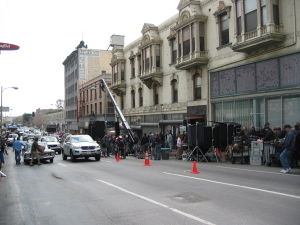 Film shooting on Location in Downtown Los
Angeles
Film shooting on Location in Downtown Los
Angeles
The Location Department is an often forgotten yet integral department in the creation of a motion picture. Like the Production Coordinator, it is only when things go wrong does the Location Manager usually get any recognition. In Hollywood, they are represented by the International Brotherhood of Teamsters Local 399 but are commonly associated with production as being part of the management of a show and as such, are generally paid a weekly salary as opposed to an hourly wage.
The Location Manager is responsible for the finding and securing locations to be used and coordinating the logistics involved for the production to successfully complete itís necessary work. They are also the face of the production to the community worked in and responsible for ironing out all the issues that may arise in response to the productionsí impact on the community.
The Location Manager typically is also the primary Location Scout for a film however they do usually oversee several other scouts and assistant managers during the course of a show. They will commonly work very closely with the director and the production designer during preproduction to find and secure the creative vision expressed by them, and responsible for public relations in regards to the locations used and the safety of the crew during filming.
A Location Scout is responsible for the initial scouting of all the locations used in a film and translates the writer and directorís vision for the look of the scene into a viable and appropriate location. An experienced Location Scout will take into account all the logistics necessary for the production to adequately work.
Some of the many things that a Location Scout needs to be aware of before submitting a location for approval are the fees and budgetary restrictions of the production, local permitting costs and regulations, camera and lighting requirements, convenience to other locations, crew, production services, crew and unit parking, and potentially incidental issues such as direction of the sun, traffic in and around the location, airplane flight paths, weather patterns, road work, demonstrations and even possible interest by local organized crime families.
Once a location has been determined to meet the appropriate look, the Location Manager must then schedule dates for prep, wrap and strike, negotiate with the property owner an appropriate fee as well as fees to any neighbors and tenants that may also be impacted by the production, apply for the necessary permits through the local municipality and/or community and housing associations, arrange parking for trucks, equipment and crew, prepare temporary facilities for holding production, talent, crew and meals, and insuring the security of the location, the safety of the crew and minimizing the impact to the surrounding community.
A good Location Manager is well poised and able to think fast on his feet as they are constantly on the go, usually preceding production to a location and overseeing final strike and wrap. They are the first and last people the public sees to represent the production and responsible for insuring that the location is returned to the condition it was received.
They need to be intrinsically aware of the productionsí needs and know how to best accommodate them while diplomatically insure the requirements of all parties involved from the property owners, line producer, director and production designer to the grip and electric lighting and rigging the set and their teamster brothers with all their trucks, trailers and vans.
Itís no wonder that Location Managers tend to easily adapt to and make good Production managers.
External links
Categories: Film crew




 216.73.216.133
216.73.216.133 User Stats:
User Stats:
 Today: 0
Today: 0 Yesterday: 0
Yesterday: 0 This Month: 0
This Month: 0 This Year: 0
This Year: 0 Total Users: 117
Total Users: 117 New Members:
New Members:
 216.73.xxx.xxx
216.73.xxx.xxx
 Server Time:
Server Time: